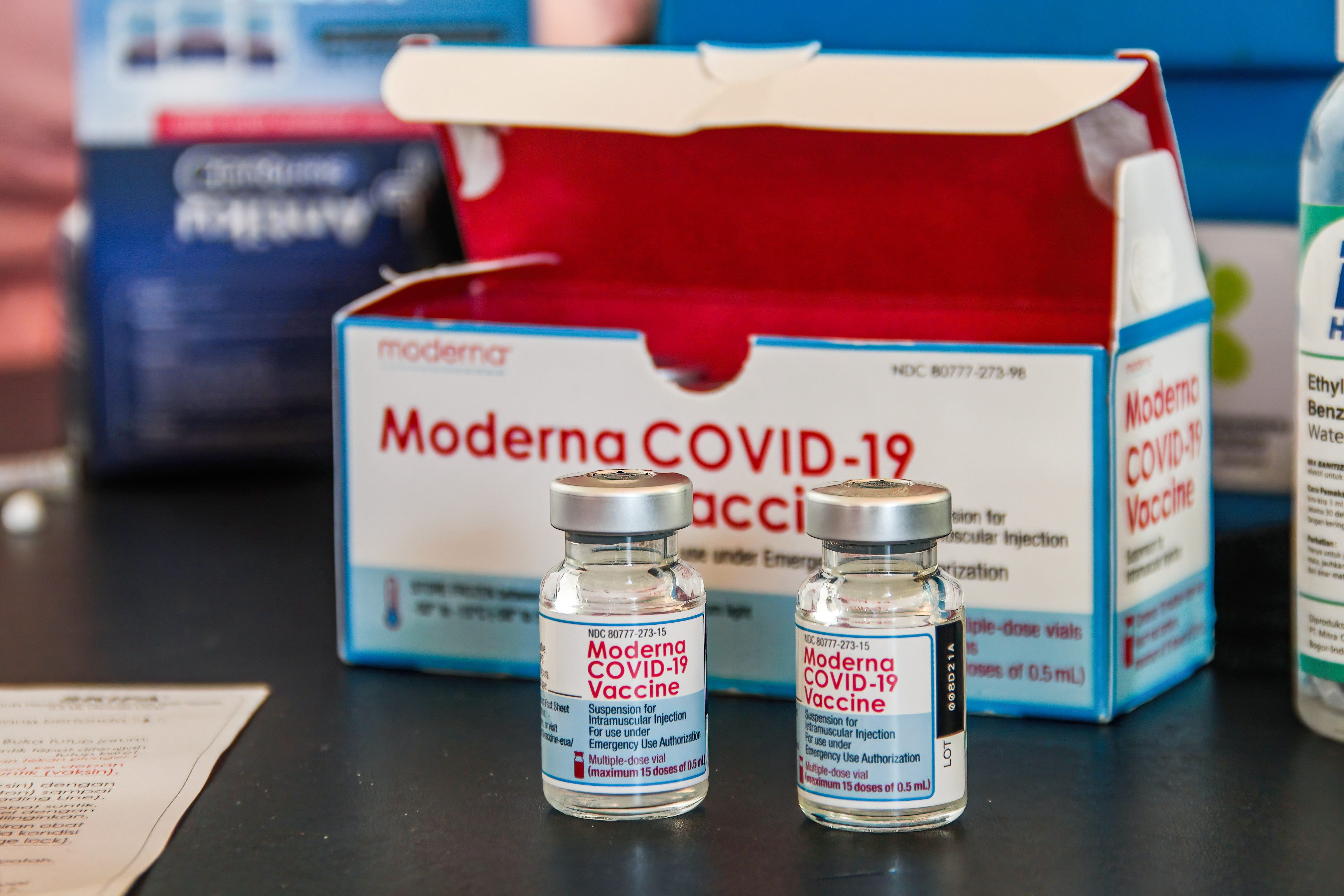Moderna booster: How well does it protect against omicron?

Moderna’s half-dose booster shot has shown a 37-fold increase in antibodies against omicron.
Algi Febri Sugita/Getty Images
Medical experts and scientists now agree that current COVID-19 vaccines offer less defense against the surging omicron variant and that booster shots increase that protection. A recent Lancet study found that the Moderna booster protected best — raising antibodies 32 times in those previously vaccinated with Oxford/AstraZeneca.
On Monday, Moderna announced two major supply agreements — 20 million doses for South Korea and 7 million for Switzerland. Canada also announced on Monday that the Moderna would be the primary supplier in its new booster campaign, according to the Globe and Mail.
However, a report from the UK on Friday indicates that booster effectiveness starts to decrease notably after 10 weeks. As more countries like Germany, Israel, and South Korea shorten the wait time for booster shots, US experts are considering a similar approach.
In a briefing released Friday, the UK Health Security Agency announced that the Oxford/AstraZeneca, Pfizer/BioNTech and Moderna vaccines all protect against omicron less than they did against delta and that protection from boosters wanes in time. Booster effectiveness generally decreased from 60%-70% protection at 2-4 weeks after the shot, down to 35%-45% at 10 weeks, depending on the combination of vaccines administered.
The UK report also adds weight to the hope that omicron infections are less severe than with the delta variant, noting that the risk of hospitalization from omicron is about three-fifths of that from delta.
On ABC’s This Week on Sunday, Dr. Ashish Jha, dean of the Brown University School of Public Health, discussed the possibility of shortening the wait time for boosters. He noted, “The data suggests both from Moderna and Pfizer vaccines that shortening it to as little as three months, but probably more in the sort of four to five months range, because we do see a waning of the immunity of the antibodies by four to five months.”
In a report published on the preprint site Medrxiv, scientists at Copenhagen’s Statens Serum Institut examined health records of 3 million Danes taken between Nov. 20 and Dec. 12. They found vaccine effectiveness among seniors 60 and older who had received a booster dose 14 to 44 days earlier averaged 54.6%, according to Reuters. (That’s comparable to the rate found shortly after receiving one shot of the Pfizer vaccine, which quickly wanes.)
Their research hasn’t been peer-reviewed yet, but it follows preliminary data from last week indicating Moderna’s half-dose COVID booster shot can raise antibody levels against omicron 37-fold. Moderna President Stephen Hoge said during a conference call that the lab results were “reassuring” and put booster recipients “comfortably” above the level of a breakthrough risk.
Moderna also indicated a potential double dose of the booster, 100 micrograms versus 50 micrograms, would increase omicron-neutralizing antibodies “approximately 83-fold higher than pre-boost levels.”
Omicron has quickly become the dominant strain in the US, accounting for nearly 59% of new COVID-19 cases. While it appears able to evade some of the defenses offered by two doses of the Pfizer and Moderna vaccines, boosters offer some protection against infection and are highly effective in preventing serious illness. President Biden recently announced new plans — including “free” at-home COVID-19 test kits and stricter rules for international travelers — to protect Americans from the surging omicron variant.
The CDC urges anyone 18 years or older to get a booster six months after their second dose of Moderna or Pfizer (and anyone 16 or 17 years old to get a booster six months after their second dose of Pfizer). On Dec. 16, a CDC advisory committee recommended Moderna’s Spikevax and Pfizer-BioNTECH’s Comirnaty, both mRNA vaccines, over Johnson & Johnson’s one-jab carrier, or virus vector, vaccine.
According to Our World in Data, the US averaged about 838,000 booster shots per day for the week ending Dec. 21. More than 64 million Americans have been boosted since Aug. 13. The increased focus on boosters comes as the omicron variant forces the CDC, health officials and organizations to reconsider what it means to be “fully vaccinated.”
So far, the vaccines have proven highly effective in…
Read More: Moderna booster: How well does it protect against omicron?

